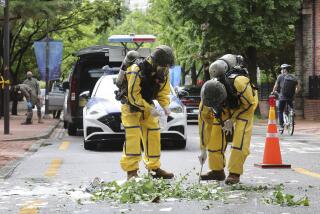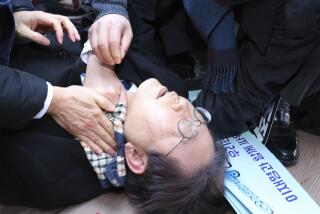Analysis : Huge Seoul Crowdâs Message: Military-Dominated Government Must Go
SEOUL, South Korea â More than 1 million people in this capital--a tenth of the population--delivered the message to President Chun Doo Hwan on Thursday that democratic reform is not enough.
Military-dominated government also must end, they said with their feet, their cheers and their applause as a funeral procession for a slain student turned into the most massive anti-government rally that Chun has seen since he seized power in a coup in May, 1980.
And there was another message for both Chun and the nationâs long-suffering advocates of democracy: For South Koreaâs small but growing bands of radical students, nothing is enough. Their actions Thursday in both Seoul and Kwangju seemed to demonstrate that violence, not merely free expression, remains their goal.
The newspaper Chosun Ilbo reported that 1 million people turned out in the capital for the funeral, its procession and what became an anti-government, anti-American rally in City Hall Plaza, a broad square where boisterous welcomes for visiting American presidents have taken place in the past.
Recalling those occasions, a man in his 40s said: âThose crowds were mobilized by the government. This one is spontaneous.â
Thursdayâs multitude also was many times larger than any of those during 18 days of street demonstrations in June that led the authoritarian Chun to promise on July 1 that South Korea would be changed into a fully democratic nation.
Chunâs pledge came two days after his handpicked successor, Roh Tae Woo, chairman of the ruling Democratic Justice Party, startled the nation by proposing to accept everything the opposition had demanded, a move many regarded as a ploy to transform Roh into a viable candidate in direct, popular presidential elections to be held by the end of the year. Chun approved Rohâs proposals.
Until then, Roh was to have run in an indirect election that could be rigged to guarantee his victory.
On Thursday, the response from the masses who joined the funeral procession for a slain Yonsei University student was skepticism. Also shown was a public conviction that Roh, a former army general who helped put Chun in power, is part of a military government that itself no longer merits trust.
Chunâs government, in an attempt to gain credibility, took account of the skepticism earlier in the day when it announced an amnesty and restoration of civil rights for 2,335 people. The amnesty, Information Minister Lee Woong Hee said, was aimed at dispelling âall antagonism, confrontation, disbelief and conflict which have persisted in our society.â
It clearly fell short of that goal.
Radical students in the vanguard of Thursdayâs funeral march from Yonsei University to City Hall--the first non-government street procession that Chun has ever permitted--made up no more than a tenth of the masses assembled in the City Hall Plaza. Average citizens, shoppers, office workers, businessmen and laborers filled the square and lined the roofs of adjoining buildings.
And while the radicals confined themselves to demanding that flags at City Hall and nearby hotels be lowered to half-staff in tribute to the slain student, ordinary citizens cheered and applauded. They also cheered when students pulled down American flags from three hotels and burned one of them.
Although individual Americans, including U.S. Embassy officials, in the square were treated in friendly fashion, they received an earful of complaints about U.S. policy in South Korea.
Comments were varied; the theme was universal. The United States, they said, has supported military rule in the belief that anything else would lead to instability and an increased threat from Communist North Korea, against which about 40,000 U.S. troops are stationed here.
Juneâs proliferation of declarations from Washington in support of reform here, coming against a background of seven years of the Reagan Administrationâs âquiet diplomacy,â won no more credence from the citizens in City Hall Plaza on Thursday than had Chunâs born-again commitment to democracy.
âWhen so many people want something, why doesnât the government give it to them?â asked an employee of one of the nationâs largest conglomerates.
âWe Have to Watchâ
When a reporter commented that Chun had promised to give full democracy to the people, the business employee replied, âWe have to watch these (government) people closely.â
Radical leaders of the demonstration clearly had come prepared for more than just sending the casket of Lee Han Yol off to Kwangju, where the 21-year-old student was later buried.
After the funeral procession left the square, the radicals set up a platform in front of the locked doors of City Hall and began a series of harangues through a public address system they had brought along.
An Olympic Games flag atop City Hall was taken down, as students smashed open the doors, broke about 50 windows and forced their way to the roof to lower the South Korean flag to half-staff in honor of their fallen comrade.
Radical students assert that the 1988 Summer Olympics, which Seoul is scheduled to host, should be co-hosted by Communist North Korea--the same demand the Pyongyang government is making.
Students expressed their thoughts in graffiti along the entire procession route, spray-painting walls, storefronts, sidewalks, electric poles and streets.
On a City Hall wall, they wrote: âGen. Chun, why donât you fly to Hawaii and play chess with Marcos?â--a reference to exiled former President Ferdinand E. Marcos of the Philippines.
As the flag atop City Hall was lowered to half-staff, the multitude joined the students in a moving rendition of the national anthem. Many in the crowd wept.
The radicals had had their moment in the sun, yet it was not enough.
In the sure knowledge that police would call an end to nearly eight hours of non-interference and restraint, they urged the crowd to march toward the Blue House, the presidential residence. The multitude did not move, but a band of about 1,000 demonstrators did.
Their march was halted, and the anticipated clash of police tear gas vs. studentsâ stones and firebombs began. Riot police chased some of the radicals into an Anglican Church, dragged them out and beat them before shoving them into police vans. Thus began another round of arrests, just a day after the government had freed hundreds of political prisoners.
In Kwangju, too, the radicals demonstrated that no concession is enough. There, they overwhelmed Leeâs parents and family, snatching the coffin away from them for burial in a section of a cemetery alongside the 194 victims of the 1980 Kwangju uprising--a revolt against a military coup led by Chun.
The parents, who earlier had bowed to student demands for a funeral of national scope, had wanted to bury their son in a plot on the other side of the cemetery.
Radicals, many of whom had traveled from Seoul, also taunted Kwangju police until the pepper gas attacks finally began.
Thursdayâs drama also shattered theories that had gained some credence among both Korean political analysts and U.S. diplomats, who have questioned the support popularly thought to be enjoyed by the nationâs two old-time opposition leaders.
Kim Dae Jung, 63, the opposition candidate 16 years ago in this countryâs last free, direct presidenitial election, walked through the streets with the funeral procession as crowds on the sidewalks shouted his name.
When Kim Young Sam, 58, president of the opposition Reunification Democratic Party, entered his car near City Hall and drove through the packed plaza to his office, his name was shouted, too, as the masses parted to make way. No other car passed through the crowd.
By contrast, the last time a South Korean president appeared before an unorganized crowd, much less mingled with one, was during that 1971 presidential campaign.
So security-conscious has Chun become that he conducts inspection visits at such hours as 5 a.m. and 6 a.m. and has many of his speeches read on his behalf.
By giving permission for the funeral procession to march to City Hall and keeping his police in the background, Chun was testing his nationâs ability to express opinion peacefully. And until the radicals demanded their extra pound of flesh, the democratic experiment succeeded.
But as if to prove that the government still is not ready to embrace democracy, all of the morning newspapers today were forced, once again, to obey what the government euphemistically calls âguidelines.â
The march of 1 million people did make the front pages. But it was the governmentâs amnesty and statements that it is seeking ânational reconciliation and unityâ that captured the top headlines.
More to Read
Sign up for Essential California
The most important California stories and recommendations in your inbox every morning.
You may occasionally receive promotional content from the Los Angeles Times.










